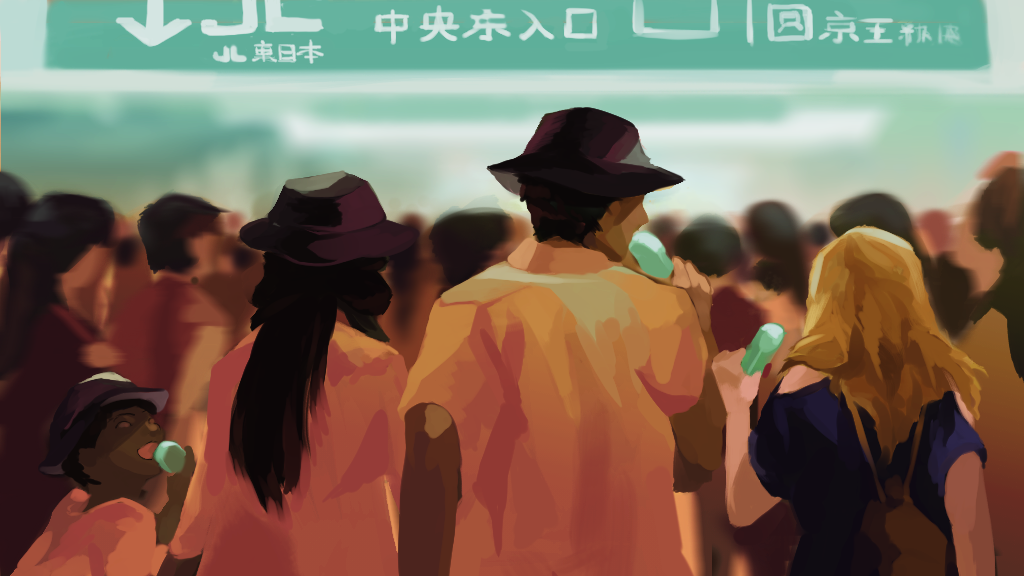Why Are You In Our Country?
by Kendra C Murphy | published Feb. 10th, 2017
On a my first flight to Tokyo, I sat next to a rather talkative Indian man; he simply was not going to leave this American girl to journal quietly in her seat by herself. Dining on compact airplane bentos together, I asked him why he too was on this flight to Japan. He told me that he had already spent some time stationed there working for his company and that his wife and child would come and join him soon.
Why would this man want to uproot himself and his family and move across the sea to a foreign island? “It’s nice. It’s clean. I like living here,” he said succinctly.
Weeks later on my commute through glistening Shinjuku Station, I came upon a family of Nepalis, decked out in touristy white bucket hats and dragging their small children along with a jaunty stride that announced them to the entire station. Somehow, I don’t really remember how, I fell into step with these foreigners. Upon learning of my familiarity with their homeland, the father of the bunch immediately pulled out a cheap Japanese ice cream bar from a large convenience store plastic bag. Handing it to me, he said, “You were in Nepal? Tell me about it!” And away we went, sailing through the train station together — the oddest sight on that evening’s commute.
The issue of immigration has been heating up for a long time now; President Donald Trump’s executive order last week was the kettle boiling over. An article from the The New York Times points out that although immigration is not the top issue in voters minds, it still plays a crucial roll as to who they cast their ballot for. Changing global politics and the recent election season have left us overwhelmed by theories, fears, and a whole lot of tweets. Our country is being pulled apart left and right, leaving everyone scared that they will be left with the smallest piece. We are all pointing fingers and forgetting how hungry everyone really is.
The election results suggest that this kind of disconnect is particularly evident between different regions and factions of America: urban versus rural, north versus south, left versus right. The Washington Post found that Americans' views on immigration vary not only due to political party lines but also depending on a person's age. In addition, views on immigration varied greatly between moderates and conservatives within the same political party. We all bring our own personal experiences to the table when deciding what to make of an issue. However, understanding each other can be increasingly difficult as the gap between our experiences widens. Maybe you live in area with a large immigrant community. Maybe that red-headed kid in your class is the oddest person you've seen. It's hard to understand what other people are seeing if you also don't also understand their vantage point.
Statistics can help us gain a little more even footing on our varied perceptions. According to the National Conference of State Legislatures, only 13 percent of the US population is foreign-born and most of these are actually naturalized citizens. Over 60 percent of visas issued for green cards and permanent residence are issued are for family members and immediate relatives of current residents and only 12 percent are actually issued for refugees. 53 percent of green cards are issued to people who are already inside the US, not first arrivals. The majority of immigrants come from Mexico, China and India, not the Middle East. The US Department of Homeland Security’s data shows that the vast majority of immigrants are naturalized in coastal or border states. These numbers paint a very different picture of immigration than what many Americans may imagine. While our White House begins making plans to ban Muslim immigrants and arrange for Mexico to pay for that wall, it might be wise for us to stop and look at who really is coming through our door.
I know on that day we certainly looked and acted quite different from your average Japanese person. Approaching strangers and eating ice cream while walking through a public space are not exactly courteous things to do in Japan. People will probably think my airplane companion’s accent is funny when he speaks Japanese, and maybe his wife won’t prepare their rice with the requisite vinegar and soy sauce. I am sure he is asked very often why he wants to bring his family to that new country. But I think his simple answer should suffice. Why should we be so suspicious of someone who simply wants to move somewhere clean and safe? It is our own human nature to want to live somewhere that enables our own pursuit of happiness. Maybe the next time you run into an immigrant crossing over our star-spangled threshold, you'll see more than a statistic or scary headline. Maybe you'll see a new American striving to create the life they want, just like you. 



